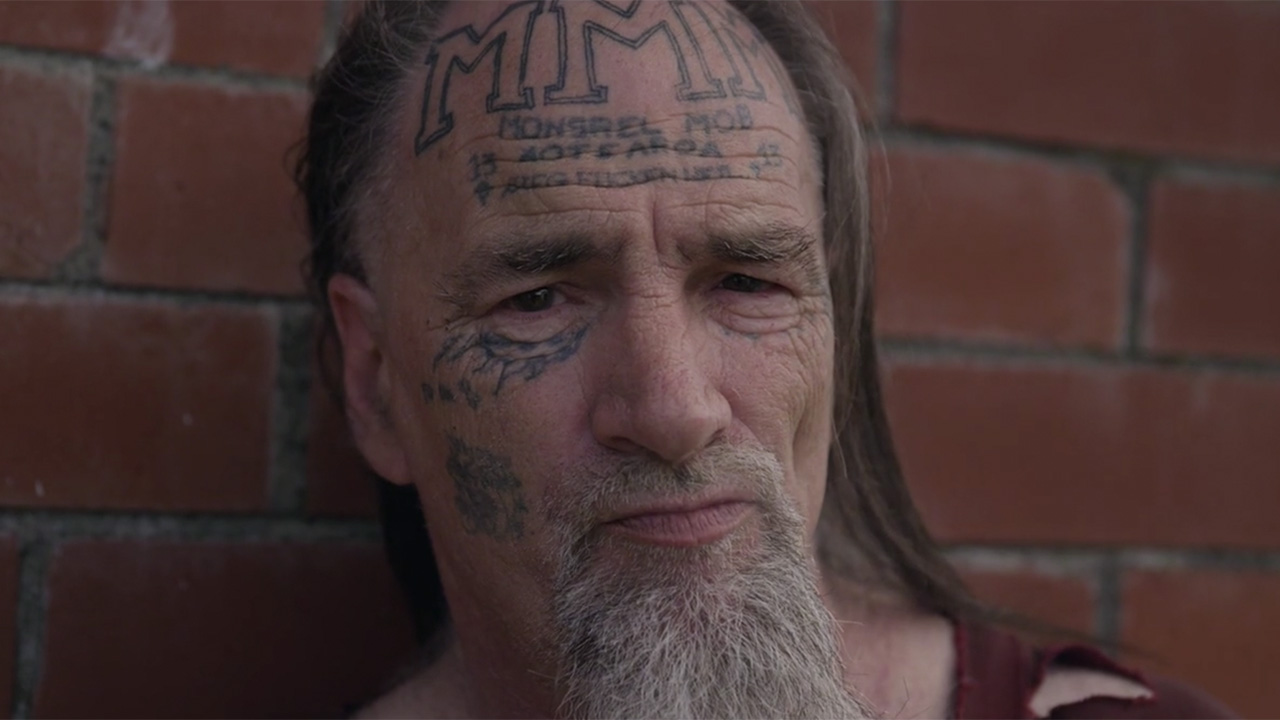When we think of gang members, most of us instantly think of the negative connotations this terms evokes – but what if that gang member was also a champion race-car driver and a loving and devoted solo-father? Much like Nathan Honnold’s intimate portrait Thomas Bennett, Tom Gould’s Skin aims to provide a peek behind the deceptively steely exterior of a man living on the outskirts of society, by breaking down the stereotypes that surround him.
As a born and bred New Zealander, Gould admits that he was inspired to create his film as a way of answering the often-asked question “What’s New Zealand like?” – with the director revealing in a recent online conversation that he believed “the best way I can show people what it’s like down there is to show them through my work, through films and through sharing stories”. Providing us with an insight into a seldom seen sub-culture of his homeland, at the heart of Gould’s Skin is his fascinating subject Martyka ‘Skin Dog’ Brandt. Heavily tattooed, comfortable in-front of the camera and with a wealth of stories to tell, Brandt seems like a documentary maker’s dream and Gould admits that after learning about his story, he just couldn’t pass-up on the opportunity to capture it on-camera:
“I was down in New Zealand last year and before I moved back overseas again I wanted to capture a part of New Zealand culture and share a story that I knew people could relate to and find interesting from my home country. I was reading a local newspaper from the Hawkes Bay region when I saw an article on the Napier/Hastings Mongrel Mob and how change was needed in the gang. It mentioned Martyka Brandt, and how he had raised 10 children as a solo father and was encouraging fellow mobsters to embrace fatherhood and their families. This really stuck with me and I wanted to find Martyka and see if he would share his story with me. The Mongrel Mob is a part of New Zealand’s history and is a topic that is constantly in the media and in discussion because of their criminal activities, but the story I wanted to tell was to show different side of the gang, a more real and personal side, something that isn’t always portrayed in the media. I wanted to expose the stereotypes that people get caught up on and to capture something that I hope will make people open their eyes and think differently.”
“I think people can relate to the story because it’s really about family. It shows the power of children in a parent’s life.”
A mixture of interviews and archival footage, Gould spent 4 days filming Martyka and his family, with the director readily admitting that he was unsure what to expect when he arrived in Napier towards the end of 2013. “As we had only spoken over the phone, it was hard to gauge how he would interview and open up to me” the director says about his subject, “but once I met him face-to-face he was amazing, full of history and stories of the Mob, but with a positive outlook on life and total love for his children.”
Not so much a tale of redemption (as Brandt never really seems remorseful about the things he has done), but more a story about the transformative power parenthood can hold, Gould’s heavily tattooed subject happily admits that he believes his children “saved him as a person” – helping him become someone who could actually hug and cry. With Brandt’s admissions of “becoming a real-person” and “finally having a heart”, it’s hard not to compare the life-changing journey of Skin’s gang member with that of Pinocchio or the Tin-Man. Like both of those fictional characters, ‘Skin Dog’ had to prove himself brave and unselfish before he could discover a “real” life full of emotion and feelings, and whilst his story may lack the flying monkeys and enormous whales of its literary counterparts, his transformation is probably more incredible and more powerful than that of a wooden boy or a rusty robot.
“The only way we can preserve anything is though documentation.”
Already working on a new short “based around New Zealand’s oldest strip club and the DJ that has being playing music there for the last 40 years” – we look forward to Gould providing more of an insight into the often unseen culture of his homeland.

 Rob Munday
Rob Munday